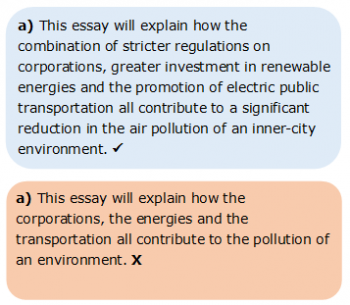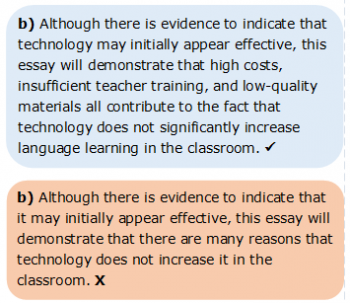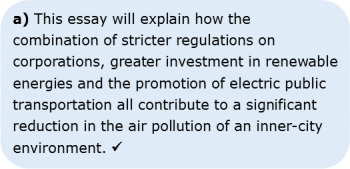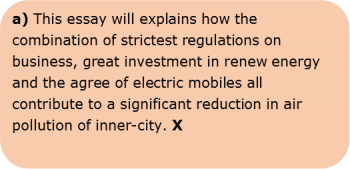How can I write an effective thesis statement?

This is the third and final chapter about Thesis Statements. To complete this short reader, read each chapter carefully and then unlock and complete our materials to check your understanding.
– Discuss seven tips for writing effective thesis statements
– Demonstrate ineffective thesis-statement examples
– Provide effective examples to help guide and inform the reader
Before you begin reading...
-
video and audio texts
-
knowledge checks and quizzes
-
skills practices, tasks and assignments
Chapter 3
One of the most common questions that students have on the topic of thesis statements is about knowing how to write a most effective statement. In the final chapter on this topic, we first provide seven tips that students should consider when writing their statements with a number of failing samples before we provide five effective thesis statements and highlight the key relevant language.
1. Include the Elements
The first tip relates to the inclusion of the thesis-statement elements which were outlined in Chapter 2. A good writer will almost always remember to include task language, task type, the main topic and their arguments. And if your essay is persuasive in nature, then don’t forget to include counter arguments as well as arguments and a clear stance throughout your essay. Remember also that common practice is to place a thesis statement at the end of an introductory paragraph.
2. Answer the Question
Next, make sure that your thesis statement directly, clearly and concisely answers a specific question – particularly one that a reader may be able to agree or disagree with. If the topic of your essay is in response to an unanswerable question or an argument that no one can disagree with, then you do not have a reasonable thesis. Make the focus of your essay 100% clear to your reader and inform them also of how you’ve investigated and answered that question.
Below are two example thesis statements that do not follow this advice. In example (a), it’s very difficult to determine the precise question of the essay, which aspects are being explored, and which group of people are being investigated.


In example (b) however, we have a clearer question, but as the main topic is a commonly accepted fact, it would be difficult for anyone to disagree with this thesis. Such a topic, therefore, perhaps doesn’t deserve academic debate.
3. Be Flexible
Particularly true for unassigned essays in which you will personally have to decide the focus of your thesis statement, it’s important that you remain flexible when writing your statement. If the topic or arguments you’ve selected change in the future – perhaps because they are unworkable, there is a lack of evidence, or you’ve simply managed to improve upon them, then don’t be afraid to change and improve your thesis statement. One well-known tip for essay writing is that introductions should be written once all argumentative aspects of the essay are fully solidified.
4. Be Specific
The fourth tip when writing thesis statements is regarding specificity. Make sure that the question you are targeting is clearly explained to the reader, that you avoid vague language in your arguments, and that your reader can clearly determine your stance and therefore gauge your overall opinion on the subject. By modifying our two example thesis statements from Chapters 1 and 2, we can see below how a thesis statement can go wrong when this advice is not followed


In example (a), the main ideas of ‘corporations’, ‘energies’ and ‘transportation’, as well as the focus of ‘pollution of an environment’, are far too unspecific and do not clarify for the reader the variables of those key ideas. Furthermore, the use of ‘it’ instead of ‘technology’ and ‘language learning’ in (b) is very unclear for the reader, with the use of ‘many reasons’ also failing to provide a specific outline of this essay’s key arguments.
5. Be Concise
In addition to the above, remember to be concise when writing – which means deleting any unnecessary words and reforming your phrases into shorter ones. Word counts are often strict in academic writing, and so you’ll need as many words available as you can. A general rule is that the thesis statement should comprise no more than 30% of the introduction, usually accounting for only one or two sentences of the first paragraph.
6. Be Unique
Particularly relevant for when dealing with an unassigned thesis is the idea of being unique and original. Try to select a topic that requires investigation, and one that hasn’t been studied before. Take a perspective on that topic that’s different or interesting and hopefully you’ll succeed at engaging your reader.
7. Edit Carefully
The final tip is to edit your thesis statement very carefully, being sure to use accurate and appropriate grammar, vocabulary and syntax. Notice in our two examples below how difficult this thesis statement is to understand when it hasn’t been carefully and correctly edited


Effective Thesis Statements
Below are three more effective thesis statements with their useful and relevant language bolded. This language has been highlighted for you so that you can use such language in your own statements.
Question 1
Should formal education be mandatory throughout childhood?
This essay argues that formal education should be mandatory throughout childhood, with evidence demonstrating that without such education, children are likely to have socialisation disorders, learning difficulties and problems in adapting to a 9-5 working environment.
Question 2
Compare and contrast the US and Chinese political systems.
This paper attempts to compare US and Chinese political systems and finds that although similarities do exist on the regional level, vast differences are apparent in how leaders are elected, how policies are decided upon, and how the public responds to the national political system.
Question 3
Evaluate whether foreign AID is successful in Africa.
Although significant sums of money have been poorly invested in the African continent, this evaluative essay determines that the effectiveness of foreign AID in Africa is apparent in tertiary educational institutions, in transportation infrastructures, and in combatting transmissible diseases such as Malaria and HIV.
Now that we’ve discussed the importance of thesis statements, have explored their elements, and have described numerous tips about writing effective statements in an academic essay, now consider unlocking our beginner-, intermediate- and advanced-level worksheets to check your understanding of this topic and its concepts.
To reference this reader:
Academic Marker (2022) Thesis Statements. Available at: https://academicmarker.com/essay-writing/introductory-paragraphs/thesis-statements/ (Accessed: Date Month Year).
Downloadables
Once you’ve completed all three chapters about thesis statements, you might also wish to download our beginner, intermediate and advanced worksheets to test your progress or print for your students. These professional PDF worksheets can be easily accessed for only a few Academic Marks.
Collect Academic Marks
-
100 Marks for joining
-
25 Marks for daily e-learning
-
100-200 for feedback/testimonials
-
100-500 for referring your colleages/friends